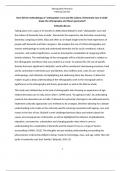Ethnographic Research
Methods [23/24]
How did the methodology of ‘Unforgotten: Love and the Culture of Dementia Care in India’
shape the ethnography and theory generated?
Critically discuss
Taking place over a span of 10 months in 2008, Biana Brijnath’s work ‘Unforgotten: Love and
the Culture of Dementia Care in India’, documents the experience she had when researching
dementia caregiving in Delhi, India and offers an in-depth insight into the lived experiences of
people with dementia and their caregivers. She employs the use of critical ethnography and
sensory anthropology to study and understand dementia and its social, emotional, cultural,
economic, and medical significance, as well as showing the complexities of caregiving within
kinship relations. The methodology of the monograph will be critically examined in relation to
the ethnography and theory that was created as a result. To analyse this, the use of specific
themes that were significant to Brijnath’s work will be considered: interviewing processes, food
and its connection to dementia care and identity, Seva (selfless acts), costs of care, sensory
anthropology, and reflexivity. By highlighting and addressing these key themes, it allows for
readers to gain a deep understanding of the ethnographic work in the monograph and its
significance to the ethnography and theory generated, as well as the field as whole.
This study was initiated due to the lack of ethnographic data focusing on experiences of age-
related dementia care in India since Cohen’s (1998) work, ‘No ageing in India’. By undertaking
research into dementia care in India, it allowed for systematic shortages to be addressed and to
implement culturally appropriate care methods to be arranged, therefore allowing for a deeper
understanding to be made on the culturally specific meanings associated with ageing, care, and
reason in the face of loss. Brijnath’s work challenged previous ideas and notions about the
causes and consequences of dementia, as well as highlighted the influence of globalisation,
migration, consumerism, urbanisation and changing gender roles when it came to
understanding the complexities of dementia and the impact it has on a range of factors
surrounding it (Ahlin, 2015). The thoughts and pre-existing understanding surrounding the
phenomenon of dementia shifted to being ‘rooted in technology, class, and age, rather than the
perils of modernity and ‘bad’ families’ (Brijnath, 2014, 8).
1





